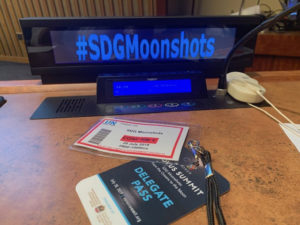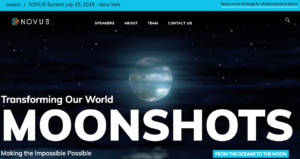Last weekend I had the pleasure of attending an unusual and inspiring event at the United Nations, hosted by NOVUS. The event, organized around the 50th celebration of the first landing on the Moon, was entitled “Sustainable Development Goals (SDG) Moonshots”, and focused on the message: “Making the Impossible Possible”, the message symbolized by the Apollo 11 mission, by the unforgettable moment when Neil Armstrong’ s feet touched the grainy surface of the moon, and by the unforgettable sentence transmitted from space: “That’s one small step for man, one giant leap for mankind.” The other focus of the event was on the mutual responsibility of all of us, inhabitants of planet Earth, and on Global stewardship.
I was invited by Kunal Sood, the founder of “X fellows and Novus”. Novus sees as its goal creating a forum where technology meets humanity to transform the world. The annual Summit held since 2016 serves as a platform to inspire inter-generational dialogue and united action for positive humanitarian impact, in order to find ways to achieve the Sustainable Development Goals stated by the UN. The presentations cover various areas of innovation, with a strong emphasis on socially aware business and on unlocking the human potential within individuals and by creating the appropriate socio-economic conditions in all parts of the globe. To read more about Novus, click the image below.

The speakers during this full day event included an impressive number of luminaries from a bewildering array of fields, ranging from cutting-edge technology, through medicine, psychology, business and entrepreneurial enterprises, space research, and more. The speakers, some of them very young researchers, shared astoundingly ground-breaking initiatives from their fields, efforts focused on expanding and improving life on Earth as we adjust to new realities, new technologies, and new horizons in brain research, medical research, use of new energy sources, food and clean water sources, as well as space research.
The landing on the moon has not only epitomized the imaginative and technological capabilities of mankind, but also for a brief moment, it united all people, regardless of nationality, religion, or skin color in a sense of being part of a whole, part of a one species, humanity, and a single home planet, Earth.
The central theme of this event, an “orbital perspective”, combining the reach for the stars with the recognition of our joint responsibility for the fragility of our existence on Earth, was movingly expressed by Astronaut Ron Goran. Ron is a retired NASA astronaut who has traveled 71,075,867 miles in 2,842 orbits of our planet during more than 178 days in space and 27 hours and 3 minutes of during four spacewalks. He flew on both the US Space Shuttle and the Russian Soyuz spacecraft.
I cannot do justice to Ron’s profoundly moving presentation, but its essence might be glimpsed in some of his statements that, after takeoff, when he was gazing at the blue sphere that is Earth, he could see no national borders. Being so disconnected from Earth, in space, he felt profoundly attached to all those who live on it. Upon returning to Earth, after the spacecraft landed on its side, on the ground, Ron said, “I could see out of the window a rock, a flower and a blade of grass, and I thought to myself, I am Home. Except I was in Kazakhstan!”
Shooting for the Moon means sustaining and promoting innovation and the imagination that inspires it, recognizing the human resources that are in all of us all over the glove and promoting the education and the opportunities that can lead us to the conceptualization and realization of new “Sustainable Developmental Goals”.
From an innovative way to capture clean water from the atmosphere at a ridiculously low cost, which would reduce infectious diseases in remote and arid countries, to food farming in sky scrapers, 35 of which could feed a city the size of Manhattan, from recycling plastics so no virgin plastics need be produced and thus protecting our environment, to expanding our ability to learn and retain information, finding a cure for chronic illnesses associated with aging, this group of outstanding scientists, astronauts, researchers and social activists carry the light of hope for abundance and cooperation on Earth, a rare perspective in these troubled times.
Irit Felsen


Leave a Reply